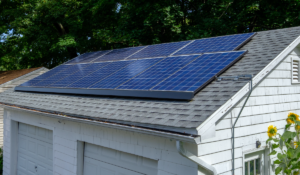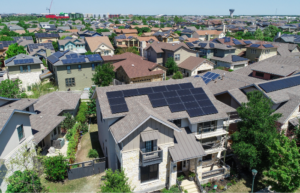New Duke Energy PowerPair Pilot Program Approved by NC Utilities Commission
 The North Carolina Clean Energy Technology Center (NCCETC) provides services and guidance to the businesses and residents of North Carolina and beyond relating to the development and adoption of clean energy technologies. Incentives play a crucial role in facilitating the widespread adoption of clean energy technologies by making them more accessible and financially feasible for individuals, businesses and communities.
The North Carolina Clean Energy Technology Center (NCCETC) provides services and guidance to the businesses and residents of North Carolina and beyond relating to the development and adoption of clean energy technologies. Incentives play a crucial role in facilitating the widespread adoption of clean energy technologies by making them more accessible and financially feasible for individuals, businesses and communities.
As the transition to renewable energy sources becomes increasingly imperative, upfront costs and perceived barriers often hinder the adoption of these technologies. By offering incentives such as tax credits, rebates and grants, governments, utility companies and other stakeholders can incentivize investment in clean energy solutions, thereby accelerating their deployment and driving down costs over time.
On January 11, 2024, the North Carolina Utilities Commission issued a final order approving a new PowerPair Pilot Program from Duke Energy Progress which rewards customers seeking to install rooftop solar plus battery backup. This pilot program is first of its kind, originating from a settlement that restructured Duke Energy’s net metering approach for residential rooftop solar following changes to state law. The Southern Environmental Law Center represented the Southern Alliance for Clean Energy and Vote Solar in both the settlement negotiations and PowerPair proceedings.
 Duke lists three main objectives of the PowerPair Pilot Program: (1) incentivizing eligible residential homeowners to adopt solar panels and battery storage systems, thereby supporting carbon emission reductions; (2) examining the operational effects of residential solar and energy storage on the electrical grid; and (3) evaluating the cost-effectiveness of investments of solar paired with storage and their contribution to meeting carbon reduction targets.
Duke lists three main objectives of the PowerPair Pilot Program: (1) incentivizing eligible residential homeowners to adopt solar panels and battery storage systems, thereby supporting carbon emission reductions; (2) examining the operational effects of residential solar and energy storage on the electrical grid; and (3) evaluating the cost-effectiveness of investments of solar paired with storage and their contribution to meeting carbon reduction targets.
Participating homeowners in North Carolina who install a qualified solar + battery system will be eligible for one-time installation incentives of up to $9,000. Participants will receive monetary incentives to offset the cost of installed equipment, with up to $3,600 provided per residence for the cost of solar panels and $5,400 provided for batteries.
The program is capped at 30 megawatts (MW) each for Duke Energy Progress and Duke Energy Carolinas, which is equivalent to 6,000 systems if each system has the maximum installed capacity of 10 kilowatts (kW). PowerPair participants will be divided into two cohorts: Cohort A participants would be served under the time-of-use (TOU) rates approved by NCUC in the net energy metering (NEM) Order and would retain complete control over the use of the energy storage device; Cohort B would be served under the Bridge Rate approved by NCUC in the NEM order and would not retain control over the battery storage device.
Cohort B participants will be a part of a new demand response program called Battery Control, which is part of the modified EnergyWise and Power Manager programs. Qualifying PowerPair installations that also enroll in EnergyWise Battery Control will receive an extra monetary incentive through a monthly bill credit adjusted based on the battery’s capability. For a 10 kW battery system, this would amount to about $37 per month, totaling $442 per year.
“As we continue to strengthen our grid and bring clean energy resources online, our customers are important partners in our clean energy future – and can receive upfront and potential ongoing financial incentives for coupling solar power and battery storage on their residential systems. As North Carolina grows in population, PowerPair gives Duke Energy an added tool to provide more reliability to solar energy which in turn benefits all customers in the state,” said Lon Huber, Duke Energy senior vice president, Pricing and Customer Solutions. “From a longer lens, programs like these enable Duke Energy to maximize the use of popular consumer technologies to support the overall energy grid.”
Graham Alexander, a solar designer at Southern Energy Management, is excited about the potential of this new pilot program. “The PowerPair program provides a very significant incentive for homeowners looking not just to produce clean energy but also to store it in their home,” said Alexander. Southern Energy Management has been installing solar systems in North Carolina for more than two decades and is a Duke Energy Progress Trade Ally installer. Learn more on Southern Energy Management’s article on PowerPair.
Based on Duke’s estimates, the installed equipment would cost an estimated $30,000 assuming solar panels of 10 kW and a battery capacity of 13.5 kW hours. By combining the PowerPair incentives with the Residential Clean Energy Credit from the Inflation Reduction Act, the cost of installation would be almost halved.
Autumn Proudlove, associate director of Policy & Markets at NCCETC, shared how this pilot program will contribute to a cleaner, more sustainable future for all. “The synergy of initiatives like PowerPair alongside the Residential Clean energy Credit is empowering individuals throughout North Carolina to access solar energy like never before,” Proudlove said.
Duke Energy will collect operational data from participants to investigate the impacts of residential solar-plus-storage, assess the cost-effectiveness of these systems, and gauge the accessibility of solar-plus-storage to various demographic groups of residential customers.
“This is an important first step towards a pathway for Duke to meet electricity demand from customers more efficiently,” explained Proudlove. “The data collected in this pilot program will serve as a case study for a future where Duke Energy customers are able to participate in virtual power plants to help balance electricity demand and supply.”
Virtual power plants are emerging in popularity as a way to meet the needs of the local or regional grid. As the US Department of Energy explains, virtual power plants are an aggregation of distributed energy resource technologies that “offer a deeper integration of renewables and demand flexibility” to deliver affordability to customers and reduce overall grid costs.
Steve Kalland is the Executive Director of NCCETC. “The PowerPair program is the first substantive incentive for distributed resources we’ve seen in North Carolina in a long time,” Kalland noted. “It serves as an example of the value stakeholders are putting on behind-the-meter generation on the customer side of clean energy generation.”
 Consumers ready to take part in home energy efficiency upgrades are invited to explore NCCETC’s Word to the Wise resource, “Your Guide to Home Energy Upgrades with the Inflation Reduction Act,” to find information about home energy rebates that will be available soon through the Inflation Reduction Act. NCCETC also operates the Database of State Incentives for Renewables & Efficiency© (DSIRE), a comprehensive source of information on incentives and policies that support renewables and energy efficiency in the United States.
Consumers ready to take part in home energy efficiency upgrades are invited to explore NCCETC’s Word to the Wise resource, “Your Guide to Home Energy Upgrades with the Inflation Reduction Act,” to find information about home energy rebates that will be available soon through the Inflation Reduction Act. NCCETC also operates the Database of State Incentives for Renewables & Efficiency© (DSIRE), a comprehensive source of information on incentives and policies that support renewables and energy efficiency in the United States.